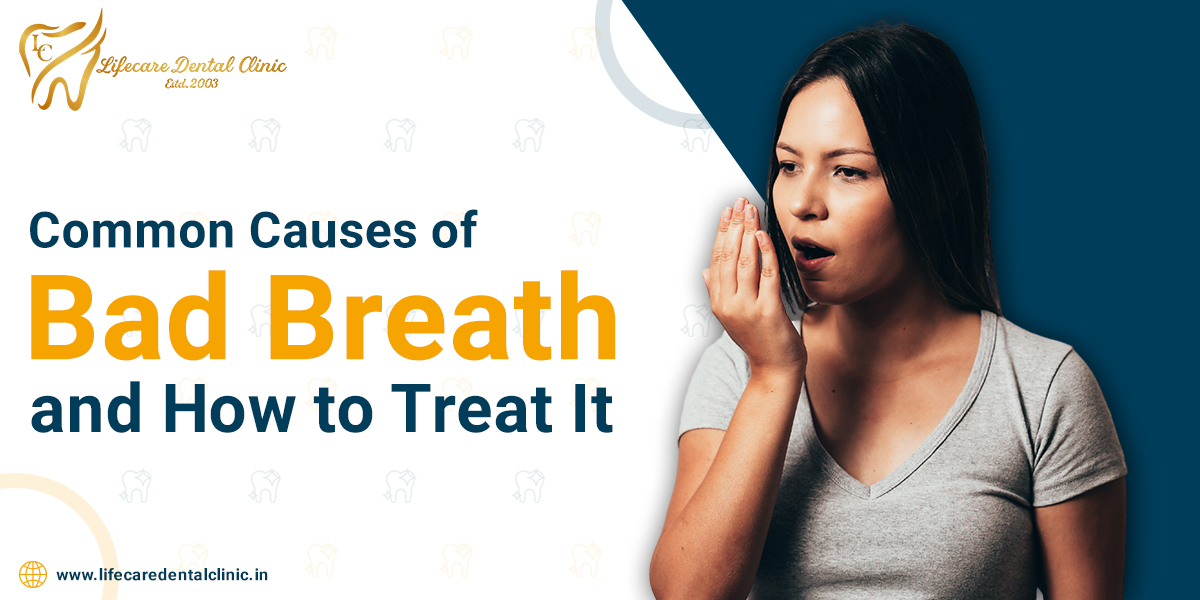Common Causes of Bad Breath and How to Treat It

Published Date: March 30, 2024 Last Update: May 18, 2024
Author: Dr. Kirandeep Kaur
Are you suffering from bad breath or did you have smelly breath? Bad breath which is also known as halitosis, can be a socially embarrassing and often distressing condition. However, you’re not alone as many people find themselves self-conscious about their breath during conversations or avoiding close contact with others. Fortunately, it is easily preventable with some understanding of its causes and appropriate care that can help you get back to feeling fresh and confident in no time. Read on to know the common causes of bad breath and what you can do to freshen your breath and boost your confidence.
7 Common Causes of Bad Breath and How You Can Treat Them
1. Poor Oral Hygiene:
Poor oral hygiene is one of the most common causes of bad breath. When you eat any kind of food, some food particles are not removed from your teeth, gums, and tongue. In order to remove those food particles, proper oral hygiene is needed as leaving the food particles in the mouth thrives bacteria and produces foul-smelling compounds that causes smelly breath.
Ways to treat it
- Brush your teeth for at least twice a day with toothpaste.
- Floss your teeth at least once a day.
- Use water flosser at least once a day to maintain good oral health.
- Clean your tongue with a scraper to remove food and bacteria.
- Use an antiseptic mouthwash to kill bacteria that might cause halitosis.
2. Eating foods having strong odor:
What you eat also impacts the air you exhale. Eating foods with strong odors like onions, garlic, or other spices can lead to temporary bad breath. As these foods are easily digested and absorbed into your bloodstream that is eventually reach to your lungs which might cause bad breath.
Ways to treat it
You can easily freshen up your breath after a flavorful meal by:
- Chewing sugar-free gum or mints.
- Drinking water to stimulate your saliva production, which naturally cleanses the mouth.
- Consuming fruits like oranges or apples that increases saliva and helps scrub away food particles.
3. Dry Mouth:
Your saliva helps to keep your mouth clean by neutralizing acids produced by plaque and washing away dead cells that accumulate on the tongue, gums, and cheeks resulting in dry mouth. A dry mouth can be caused by certain medications as medicines decompose cells and can cause bad breath.
Ways to treat it
- Drink enough water throughout the day to keep your mouth moist.
- Chew sugar-free gum to stimulate your saliva flow.
- Use a room humidifier if the air in your home is dry.
- Avoid eating tobacco and drinking alcohol as these can dry out the mouth.
4. Infections in your mouth:
Infections in the mouth due to oral surgeries or oral problems like dental abscesses or gum disease (periodontitis) can also contribute to bad breath. These infections are caused by bacteria buildup that can cause inflammation and produce foul-smelling gases or compounds when you break down food particles and tissue.
Ways to treat it
- Maintain proper oral hygiene
- Visit the best dental clinic in Chandigarh for a proper oral check-up and teeth cleaning
5. Medication:
Some medications for conditions such as urinary tract infections or respiratory infections have components that are released in the breath as they are broken down in the body, which may have a strong or unpleasant smell and can also lead to dry mouth by reduces saliva production. The saliva is essential for cleansing the mouth and removing particles that can cause odors. The inadequate saliva production in the mouth causes a dry mouth and therefore provides a breeding ground for bacteria, leading to bad breath.
How to treat it
If your medication is causing dry mouth, consult with your doctor to get an alternative medication option without having any side effects.
6. Bad Lifestyle Choices:
Bad lifestyle choices such as drinking alcohol and smoking not only leave an unpleasant smell but also dry out the mouth and contribute to gum disease.
Ways to treat it
- Seek guidance from healthcare professionals on quitting smoking.
- Try nicotine replacement therapy
7. Other Health Conditions:
Occasionally, bad breath can signal underlying health conditions like sinus infections, tonsillitis, digestive issues or more serious diseases including diabetes or liver or kidney problems.
If you’ve practiced proper oral hygiene but still bad breath persists:
- Consult with an experienced dentist in Chandigarh to find out your oral health concerns.
- Visit your physician for a full body check-up.
Conclusion:
By incorporating regular dental check-ups, proper brushing and flossing techniques, hydration, a balanced diet, and professional dental treatments if necessary, you’re on the right track to maintaining fresh breath. Remember, while occasional bad breath is normal but the persistent issues should not be ignored as they could indicate underlying health problems. So, take control of your oral health today in order to speak with confidence!
Read this article:- Tips to Avoid Gum Disease According to Best Dental Clinic in Chandigarh

Leave A Reply